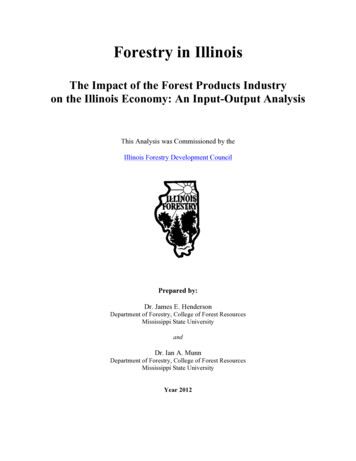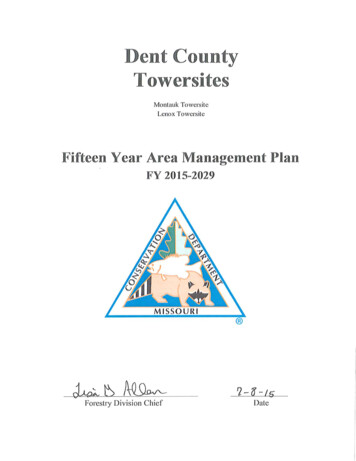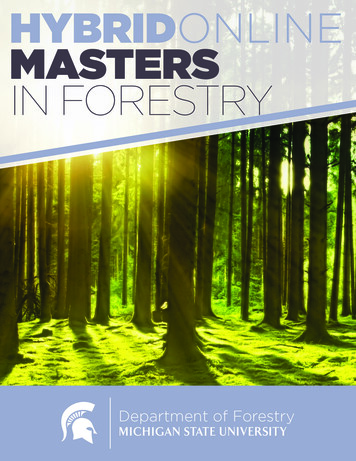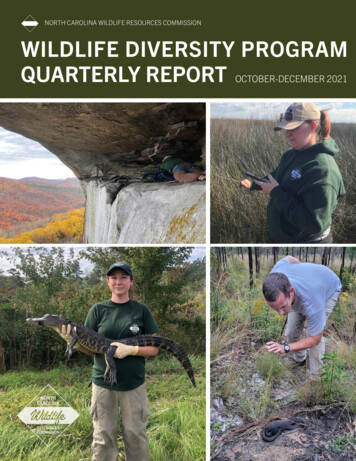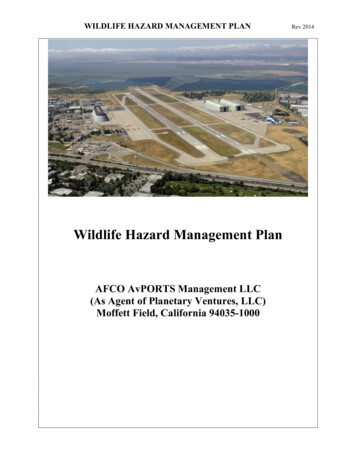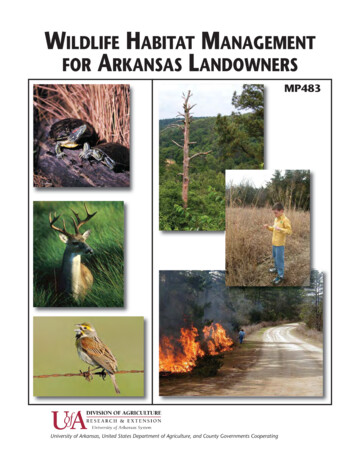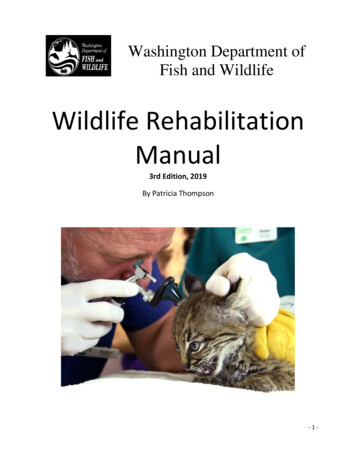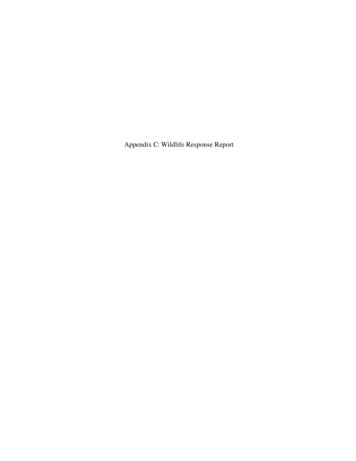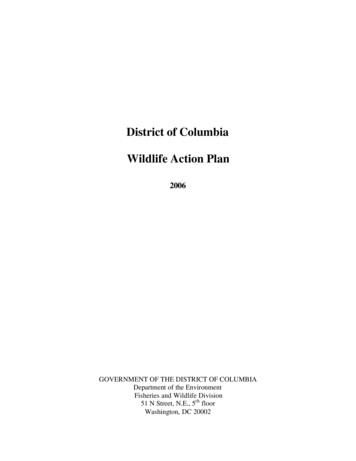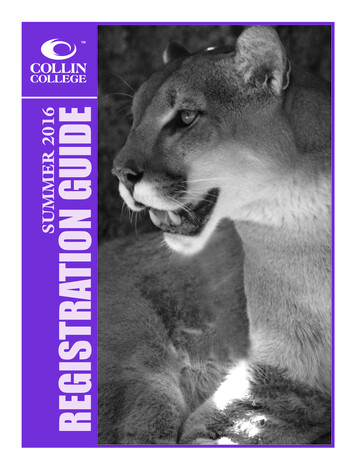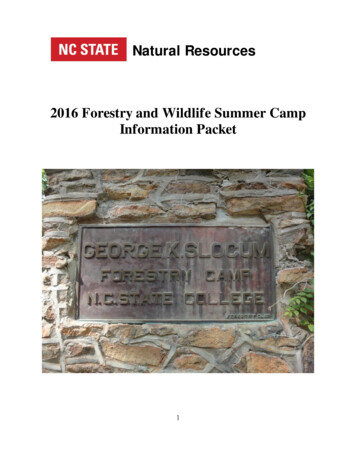
Transcription
Natural Resources2016 Forestry and Wildlife Summer CampInformation Packet1
For Students Enrolling in Forestryand Fisheries and Wildlife Summer Camp 2016The summer camp program of the Forest Management and Fisheries and Wildlife Sciences Curricula atNorth Carolina State University is a full-time residential program of summer courses that lasts 9 weeks forforestry students and 6 weeks for fisheries/wildlife students. Students register for NCSU summer schoolbut live, learn, and work in an off-campus forest environment. The objectives of the summer camp programare to:1. Provide instruction in ecosystem concepts, structure and function of plant and animalcommunities, management practices, and practical field skills.2. Expand practical knowledge in a variety of subjects related to the curriculum to enhance theirability to understand and apply subjects covered in the advanced professional courses.3. Enhance abilities as professionals to work in teams and to assume positions of leadership.4. Introduce students to a variety of realistic work environments and practices to enable them tobetter evaluate forestry or fisheries/wildlife management as a career.CURRICULA AND SCHEDULEStudents should preregister through TRACS for the summer school courses outlined below: Fisheries/wildlife students should register for FW 311, FW 312, FW 313, and FW 314. Forestry students should register for FOR 204, 261, 264, 265, and 273.Because summer sessions are normally limited to 6 hours, Foresters need to ask you advisor toraise the credit limit to 9 hours for Summer Session 1.Courses are taught as a combination of classroom lecture/discussion, outdoor instruction/discussion,outdoor practical exercises, tours, field trips, guest speakers, and self-study. A detailed schedule of theentire program will be issued at the opening orientation session on Sunday evening, May 8, 2015.Classes will be conducted from 7:30 a.m. to 4:30 p.m. or later due to travel and weather conditions,Monday through Friday each week. Wildlife students will begin most days earlier in the mornings to studybreeding birds. Some weekend activities are scheduled.VERY IMPORTANT MESSAGE FOR ALL STUDENTS:All Forestry students must report to Slocum Camp between 3:00 – 5:00 p.m. on Sunday, May 8,2016 for check-in and cabin assignments. A cookout for students, parents, and faculty will be heldat 6:00 p.m. on May 8, sponsored by the Department of Forestry and Environmental Resourcesat no charge. Immediately after the cookout, there will be an orientation and introductory sessionfor students.2
Table 1. List of courses, credits, and instructors for each CampCourse #Course TitleCreditsWeeksInstructor(s)--------- Forestry Camp --------Silviculture27,8Forest Communities25,10Forest Wildlife14Fire Management16Mapping & Mensuration31, 2, 3SniderBrahamMoormanRoiseHaunspergerFOR 204FOR 261FOR 264FOR 265FOR 273TOTAL9---------- Fisheries/Wildlife Camp -------FW 311FW 312FW 313FW 314Fisheries & Wildlife Inventory& ManagementFisheries Techniques andManagementMountain Wildlife Ecology andManagementMarine FisheriesTOTALWeekDates12345678910May 9-13May 16-20May 23–27May 30- June 3June 6– 10June 13 – 17June 20 – June 24June 27- July 1July 4 – July 8July 11 – 15FORESTRYCourseFOR 273FOR 273FOR 273FOR 264FOR 261FOR 265FOR 204FOR 204VacationFOR 26132, 3, FECourseFW 314FW 311FW 311FW 311FW 312FW ci
Eligibility to attend summer camp is stated in the respective curriculum guidelines. However, final approvalfor summer camp registration will be made by Dr. Gary Blank (Department of Forestry and EnvironmentalResources, Director of Undergraduate Programs) for forestry students and Dr. Chris DePerno(Coordinator, Fisheries/Wildlife Curriculum) for fisheries/wildlife students. Students who have a questionabout academic eligibility should contact Dr. Blank or Dr. DePerno.Course grades are based on examinations, reports, and exercises. See individual syllabi for details.LOCATION AND FACILITIESThe summer camp program is based at the G. K. Slocum Camp located on the George Watts HillDemonstration Forest, located 14 miles north of Durham, NC. Hill Demonstration Forest (2,478 ac) is aresearch and teaching forest of the Department of Forestry and Environmental Resources. It contains avariety of forest types, stand ages, wildlife habitats, ponds and streams, management regimes, and researchprojects. Both summer camp groups will make several overnight trips to other locations during the courseof the camp program.Students live in rustic cabins designed for 4 people. Living areas are provided with electricity, bunk beds(with mattresses), desks, lamps, chairs, and dressers. Central latrines are provided with flush toilets, sinks,mirrors, showers, and hot water. A mess hall serves three hot meals per day, Monday through Fridaynoon. Individuals who wish to remain at camp over the weekend may make arrangements for use of themess hall or travel to nearby towns for meals. Most students leave camp on weekends. No foodpreparation is permitted in living areas.Guests are not permitted at Slocum Camp without permission of the camp director or hisdesignate.Slocum Camp is equipped with a telephone, but its use is strictly limited to emergencies. The number is(919) 477-1125. Mail pickup and delivery at Slocum Camp is handled by the staff. Mailing address is:NCSU Forestry Camp, P.O. Box 71, Rougemont, NC 27572.Commercial laundries and complete medical service are available in nearby Durham. First aid and manynon-prescription medical supplies are provided free-of-charge in the faculty cabin at camp. A safetyinstruction manual is given at the orientation session. Students are not covered by College or Universityinsurance, including while riding in a College vehicle. All students must complete and return theEmergency Contact spreadsheet via e-mail and the signed Code of Conduct Form to GlennCatts/Liz Snider by 3:00 PM on 15 April.Ample parking for personal vehicles is available at Slocum Camp. No permit is needed.4
ADMINISTRATIVE AND INSTRUCTIONAL STAFFCamp Coordinators – Glenn Catts and Elizabeth SniderPrincipal Instructors:Dr. Jeffrey BuckelMathew HaunspergerDr. Richard R. BrahamElizabeth SniderDr. Chris DePernoDr. RoiseDr. Thomas KwakDr. Chris MoormanDr. Laura PacificiResponsibility:Marine FisheriesMapping and MensurationForest CommunitiesSilvicultureWildlifeFire ManagementInland FisheriesForest WildlifeMountain WildlifeEXPENSES - 2016Regular summer school tuition and the summer camp fee will be billed by the University. See thesummer session schedule, at asp for details. There is nocharge for use of the cabins at Slocum Camp. Cost of meals at Slocum Camp and most costs of room andboard at facilities utilized on overnight trips away from Slocum Camp are included in the camp fee notedbelow. Guests will be charged 5.00 per meal.Estimated CostUniversity Tuition (estimated using Summer 2015 rates for summer sessions)and projected Camp Fees:CurriculumResidentNon-residentCamp FeeFOM 2,460 7,158 1,605FW 1,640 4,772 1,329The Forestry camp fee is based on 125.00 per week for food at Camp Slocum for 7 weeks, plus 655 fortwo 1-week field trips and one 2-day field trip away from Hill Forest, plus 75 per student to take theCommercial Pesticide Applicator’s License Test. The Wildlife camp fee is based on 125.00 per week forfood at Camp Slocum for 4 weeks plus two one week trips ( 796) away from camp. These costs areestimates that could change. There may be additional costs during travel on field trips.Transportation for all instructional activities, including extended overnight trips, will be provided. Minoradditional expenses for meals during extended travel for field trips will also be incurred.5
BOOKS AND EQUIPMENTPersonal ItemsStudents should bring clothing suitable for vigorous activities in the woods. Sturdy field boots, rain gear, andsweaters or jackets early in the summer are essential. It is usually surprisingly cold the first week or so ofcamp. Work gloves (preferably with leather palms) are recommended for all students. Lack of properclothing will not excuse students from class or duties. Students must provide their own pillows andbedding, either a sleeping bag or sheets and blankets, and personal articles such as toiletries. Recommendeditems include water bottle, small pack, insect repellent, duck tape (for tick defense), sunscreen, sunglasses(polarized if possible), hat, and flashlight. Also recommended for fisheries/wildlife students are binoculars,swim suit, chest waders or hip boots if available, fishing tackle if available, and old tennis shoes for aquaticstudies.Books and Academic EquipmentThe following books and items of equipment are required (unless otherwise noted). Books will be availableat the NCSU Bookstore (unless otherwise noted), and should be purchased prior to the opening of Camp.No books or supplies are available for sale at camp. A limited reference library will be available atcamp. Note: Required texts are bolded and italicized below.FOR 204:FOR 261:FOR 264:FOR 265:FOR 273:FW 311:FW 312:FW 313:Coursepak (provided)Classification of the Natural Communities of North Carolina.N.C.Natural Heritage ProgramNorth American Trees, Preston and Braham.Coursepak providedForest Plants of the Southeast and Their Wildlife Uses. Miller & MillerThayer’s Guide to Birds on N. America Software (strongly suggested)Required texts detailed in equipment order, and bundled to get discount.Forest Measurement, Avery and Burkhart, 5th edition.Coursepak (provided)(1) Summer Camp Coursepak (provided)(2) The Sibley Guide to the Birds, David Allen Sibley (or suitable substitute)(3) North America Trees, Preston and Braham, or Trees of the Southeastern UnitedStates, Duncan and Duncan (may be out of print).(1) Thayer’s Guide to Birds on N. America Software(2) Forest Plants of the Southeast and Their Wildlife Uses. Miller & Miller(3) A Field Guide to Animal Tracks, Murie.(4) A Field Guide to the Mammals, Burt and Grossenheider.(5) Research and Management Techniques for Wildlife and Habitats, BookhoutNo texts required.No texts required.6
Students must provide their own materials needed for producing reports and taking notes such as writingtools and paper, hand calculator, dictionary, and clipboards. Limited drawing equipment will be available onloan at camp. Laptop computers will be available for class assignments and producing reports. Students areencouraged to bring their own computers. Surge protectors are recommended.Wildlife students will need a handheld, recreation-grade GPS unit. If the student wants to supply their ownGPS unit, they will still need to purchase or supply a two-way radio for communication use during class. Ifyou have your own comparable GPS, bring it -- there is no need to purchase a new one. Although the GPSunit is expensive, a well-trained biologist must be experienced in using GPS, and having your own is the bestway to get started. Wildlife students also need the Thayer Guide to Birds of North America and a Silvacompass.CAMP OPERATIONSMeals will be served as follows: Breakfast 6:30 a.m. - 7:00 a.m.; Lunch 11:30 a.m. - 12 noon; Supper 5:30p.m. - 6:00 p.m., Monday through Friday lunch. To minimize expenses and maintain satisfactory living andworking conditions, each student will be expected to share in the general camp maintenance. A few dutiesare listed below:1.2.3.4.5.6.7.Clean showers and toilets daily.Serve meals and clean the mess hall.Clean classrooms daily.Clean cabins periodically.Keep personal areas clean and neat.Clean camp grounds and common areas daily.Clean and maintain equipment.A duty schedule will be distributed at the orientation session.REGULATIONS1. Camp is operated by the Department of Forestry and Environmental Resources. Faculty andstudents are subject to North Carolina State University campus rules and regulations.2. Vehicles furnished by the University will be used only for official business as approved by the faculty.3. All school-owned equipment used by students must be checked out. Lost or broken items will bepaid for by individuals, crews, or the entire class.4. Forest areas used for research programs will not be disturbed; care must therefore be taken to avoiddisturbing stakes, posters, or other markers. Cutting and blazing of trees will be permitted onlyupon approval of the instructor.5. Firearms and fireworks are prohibited at Slocum Camp.6. The living conditions in camp will not allow pets.7. Student parking in the camp will be controlled by the Camp Director.8. If you want to fish, you must have a valid North Carolina fishing license.7
9. Quiet hours will be strictly observed after 10:00 p.m.10. All individuals will be appropriately dressed outside their own quarters, especially during meals.11. Refrigerators, hot plates, televisions, stereos, air-conditioners, and other appliances that use largeamounts of electricity are not permitted, because of limited electrical capacity.12. Policy on use of alcoholic beverages and illegal drugs is the same as that in effect on campus with theexceptions noted below.It is the intent of the College of Natural Resources that all policies relating to the possession and use ofalcohol and illegal drugs on forest properties managed by the College of Natural Resources comply fully withthe N.C. general statutes, N. C. State University policies, and applicable city/county ordinances, and thatthese policies demonstrate a sensitivity to the issues surrounding alcohol and illegal drug use. Specificextensions of the University policy in effect during the summer camp program are as follows:1. Possession and consumption of alcoholic beverages is not permitted in Camp Slocum or HillForest or at anytime on field trips.2. The illegal possession, manufacture, sale or delivery of any controlled substance (except for prescriptionmedicine) is prohibited.Students are responsible, as citizens, for knowing about and complying with North Carolina laws relating toalcohol and illegal drugs and to the policies of the University and summer camp. Misuse of these substancesis not conducive to the advancement of academic knowledge and understanding, nor compatible withthe highlevel of professionalism to which we aspire. Students violating this policy will be dismissed from SummerCamp. No refunds will be made.Policy on Ethical Academic ConductDeveloping a pattern of ethical conduct and strengthening personal integrity are as much a part of youruniversity experience as is mastering subject matter to which you are exposed. The faculty in the Departmentof Forestry and Environmental Resources expects that studies and life at North Carolina State University willenhance your understanding of ethical practice and your resolve to maintain personal integrity in the face ofchallenges.The faculty recognizes that academic and professional life may present numerous opportunities to deviatefrom expected ethical standards and that each presents a challenge. Some kinds of unethical conduct areobvious--e.g., copying answers to test questions from another's paper, or incorporating material written byothers without due credit and submitting it as your own. Other examples are not so clearly defined--e.g.,failing to identify the products of collaborators or capitalizing on the ideas of others without giving propercredit. The faculty expects that in all such situations you will remember that each temptation successfully metstrengthens your ability to resist the next, and each failure of resolve weakens your ability to withstand thenext temptation. Failures will be treated seriously, with consequences appropriate to the situation surroundingthe failure.8
Erosion of personal integrity brings two kinds of penalties. The first and most important, but the most difficultto identify, is loss of self-esteem and self-respect. Those who maintain high standards simply feel betterabout themselves, and their performance reflects that situation.The second kind of penalty is more tangible and receives greater publicity. In the context of coursework, itincludes such possibilities as receiving a failing grade on a test or assignment, receiving a failing grade for thecourse, and being suspended or expelled from the university. In the larger professional context,transgressions may cause loss of your career or invoke civil and criminal penalties, even imprisonment.Academic dishonesty and applicable sanctions are well described in the North Carolina State UniversityCode of Student Conduct and Regulations or the North Carolina State University Student Handbook.Details of textual source documentation can be reviewed in The Use and Misuse of Source Materials,which is required in FOR 110 and NR 100. Students should keep and refer to it throughout their career toavoid possible misunderstanding concerning plagiarism. For graduate students, Honor in Science, apublication of Sigma Xi detailing ethical expectations and behaviors associated with scientific endeavors isavailable from graduate advisors.As a reminder of the importance of ethical conduct and personal integrity, students in the Department ofForestry and Environmental Resources may be required to sign the following pledge on works submitted:"I have neither given nor received unauthorized aid on this test or assignment."If you have any questions concerning the definition of unauthorized, check with your professor.PARTICIPATION AND COOPERATIONA "can-do" professional attitude is expected of all students. Much of the learning that occurs at summercamp is through the informal interactions among the students and between students and faculty. The campprogram is a challenging one that involves substantial intellectual and physical effort in an environment ofcloseassociation with peers and faculty for extended periods. To achieve the objectives of the camp program,students must work together with a cooperative spirit that supports the group learning goals and promoteshigh standards of academic success and personal behavior. The camp faculty and staff are confident of yourpositive response to the challenge. We welcome your questions and suggestions and we look forward to asuccessful and enjoyable Summer Camp experience.9
University Tuition (estimated using Summer 2015 rates for summer sessions) and projected Camp Fees: Curriculum Resident Non-resident Camp Fee FOM 2,460 7,158 1,605 FW 1,640 4,772 1,329 The Forestry camp fee is based on 125.00 per week for food at Camp Slocum for 7 weeks, plus 655 for
